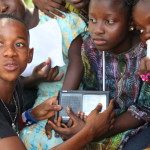Meet the 2012 Common Ground Awardees: Charlayne Hunter-Gault
Charlayne Hunter-Gault is a respected journalist with more than forty years in the industry. Between her leadership as a writer and broadcast journalist and her prominent role in the civil rights movement, Charlayne has consistently dedicated her life to creating a more open and inclusive world.
Charlayne was one of the pioneers who risked their lives to desegregate the colleges and universities of the South when, in January 1961 and following two years of efforts by the state of Georgia to deny them admission, she became one of the first two African-Americans to attend the University of Georgia.
She is the author of New News Out of Africa: Uncovering Africa’s Renaissance and In My Place, a memoir of her role in the civil rights movement. Her new book, To the Mountaintop: My Journey Through the Civil Rights Movement, is a retrospective look at her involvement with the movement, written for young readers. She describes her efforts “to continue the goals of the movement in [her] own way.”
Charlayne began her career as the first African-American reporter for The New Yorker. A writer known for her “people-centered” journalism, she went on to serve as the Harlem Bureau Chief for The New York Times and has written articles for Essence, Ms., Life, and O, The Oprah Magazine.
As one of television’s premier journalists, Charlayne challenged convention with her fresh insights on issues both close to home and of global impact. As CNN’s former Johannesburg bureau chief and correspondent, and as NPR’s correspondent in South Africa, she introduced viewers and listeners to the diversity of Africa. She spent twenty years at PBS, first as national correspondent for “The NewsHour with Jim Lehrer,” and then as anchor for the award-winning news magazine on human rights, “Rights and Wrongs.”
The recipient of numerous honors, including two Emmys and two Peabody Awards, she reports with the highest standards of objectivity and truth, touching on topics as diverse as the life of a twelve-year-old heroin addict, the invasion of Grenada, and the impact of apartheid in South Africa.
The Common Ground Awards will be presented at the Carnegie Institution for Science on November 8, 2012 at 8:00pm in Washington, DC. The Awards are presented annually by Search for Common Ground to honor outstanding accomplishments in conflict resolution, negotiation, community and peace building. Recipients have made significant contributions toward bridging divides between people, finding solutions to seemingly intractable problems, and providing inspiration and hope where often there was none. Past recipients of the Award include: President Ellen Johnson Sirleaf of Liberia, former President Jimmy Carter, Archbishop Desmond Tutu, Muhammad Ali, Sesame Workshop, and the Mo Ibrahim Foundation.
“In a world where adversarial behavior is so prevalent, we honor people who build bridges and resolve conflict” said John Marks, President and Founder of Search for Common Ground. “These are our heroes, and it feels wonderful to celebrate them.”
Other 2012 Common Ground Awardees
Ingoma Nshya (“New Era”)
Rwanda’s only female Hutu and Tutsi drumming troupe and the subject of the new documentary film Sweet Dreams.
The Interfaith Award:
Lord George Carey of Clifton, Former Archbishop of Canterbury; Imam Feisal Abdul Rauf, Chairman of the Cordoba Initiative, Founder of the American Society for Muslim Advancement (ASMA), and Imam of Masjid al-Farah in New York City; and Rabbi David Rosen, International Director of Interreligious Affairs, American Jewish Committee,
Peace Child International
Celebrating its 30th anniversary, Peace Child International empowers young people to be the change they want to see in the world, by encouraging youth to become informed and then take action.
Ambassador J. Christopher Stevens
The late U.S. Ambassador to Libya and career Foreign Service Officer who spent his life steadfastly serving to bridge divides and cultivate understanding between the United States and the Middle East, for a life of transcendence over cultural differences.










